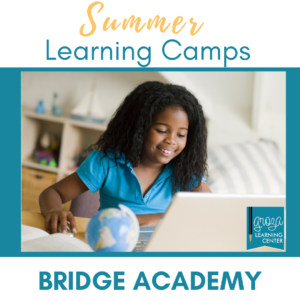
10 Ways to Prevent Summer Learning Loss
All students experience some form of summer learning loss during the vacation months when they may not participate in many educational opportunities. Furthermore, experts agree that this year’s learning loss will be exasperated due to the negative effects of distance learning. Sadly, they are anticipating a significant decrease in student achievement come fall 2021.
In fact, according to research from Northwest Evaluation Association, “30% of literacy and 50% of math gains could be lost” due to the transition to online learning.
Don’t panic, this does not mean your child is doomed. The summer is a perfect time to catch up and get ahead.
FACTS ABOUT SUMMER LEARNING LOSS:

• Only about 10% of children in the United States do educational programs or learning services during the summer months.
• According to a Johns Hopkins study regarding summer learning loss, students can have on an average two months or more of learning loss during their summer vacation.
• According to Summer Learning Loss.org ,“Two-thirds of the ninth-grade achievement gap can be explained by unequal access to summer learning opportunities during the elementary school years.”
• According to a study at the Johns Hopkins Summer Learning Loss program, 56% of children actually want to participate in educational opportunities throughout the summer.
• Research indicates that teachers can spend between 4-6 weeks teaching children the material they have forgotten over the summer.
Half an hour to an hour set aside daily can help students close learning gaps and perform at higher levels during the upcoming school year.
TEN TIPS TO AVOID SUMMER LEARNING LOSS:
Here are some tips to help you help your child avoid summer learning loss.
1. Read with your children, to your children, and encourage reading alone. Many libraries and businesses provide summer reading incentives, from certificates to prizes and gift cards.
2. Get a copy of the recommended summer reading list from your school district. If you cannot, most libraries will have one available to you. Note the names of authors your children enjoy and go back for more.
3. Use incentives to get them involved in academic programs. Reward their involvement with a special day, event or even have them work toward a special toy or video game they want.
4. Participate in activities that you cannot fit in during your normal year, like going to the park or museum. Many museums offer free family days throughout the summer months making this an inexpensive learning opportunity. Other interests could include cooking or gardening, which help children with basic math and science skills.
5. Write letters. It helps children with handwriting and spelling skills as well as organizing their thoughts. Use prompts for children 4 years and younger.
6. Get children involved in the travel planning; everything from the costs to the mapping and activities when you arrive provides learning opportunities, keeps them involved during the travel, and teaches basic life skills.
7. Start a summer journal or scrapbook. These activities help children with basic writing, organization, and math skills (for example, cutting out the shapes for pictures in the scrapbook).
8. Discuss age- appropriate current events. A great learning opportunity is finding one article in the newspaper that a whole family could discuss at dinner time. Read letters to the editor and talk or write about your thoughts.
9. Set a schedule for children and be sure to include both downtime and learning activities.
10.Use the web. There are many learning sites online with everything from coloring (teaching color recognition to young children) to math, reading, and even science programs.
If you are looking for an Educational Summer Camp for your child, consider Groza Learning Center!
Our Programs are offered in-home, online, and in-center.
For more information, call or email our office at 310-454-3731 or care@grozalearningcenter.com
Summer Camp programs have limited space.
Book Today!

